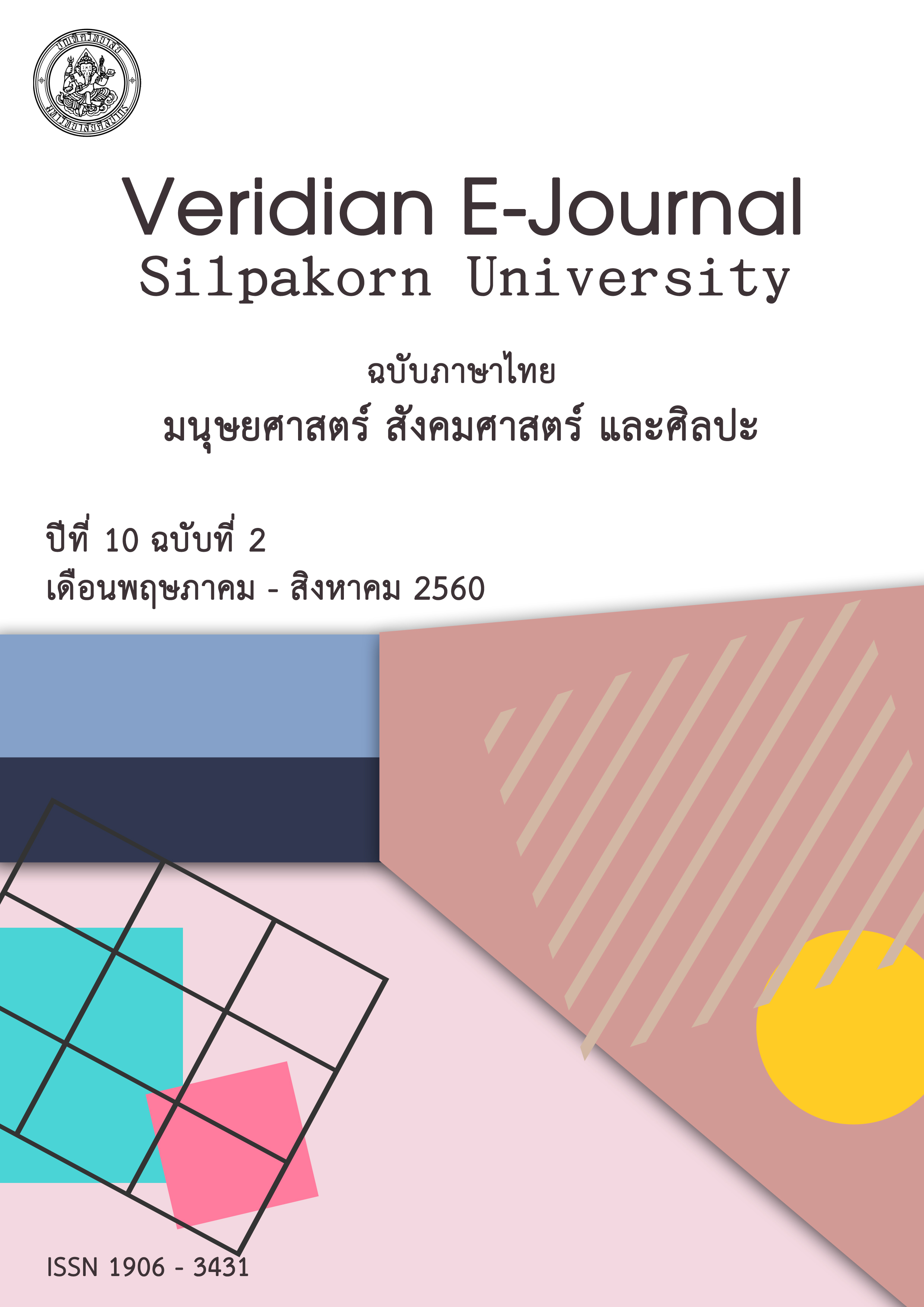การให้คำปรึกษากลุ่มแบบเผชิญความจริงเพื่อเสริมสร้างสุนทรีย์แห่งตน ของนักเรียนชั้นประถมศึกษาตอนปลาย
Main Article Content
Abstract
การวิจัยครั้งนี้มีจุดมุ่งหมายเพื่อ 1) ศึกษาสุนทรีย์แห่งตนของนักเรียนชั้นประถมศึกษาตอนปลายในโรงเรียนขยายโอกาส 2) เปรียบเทียบสุนทรีย์แห่งตนของนักเรียนชั้นประถมศึกษาตอนปลายในโรงเรียนขยายโอกาส ก่อนและหลังการให้คำปรึกษากลุ่มแบบเผชิญความจริง ประชากรที่ใช้ในการวิจัย เป็นนักเรียนที่กำลังศึกษาอยู่ระดับชั้นประถมศึกษาปีที่ 4 – 6 ภาคเรียนที่ 1 ปีการศึกษา 2559 ในโรงเรียนขยายโอกาสสังกัดสำนักงานเขตพื้นที่การศึกษาประถมศึกษาสุพรรณบุรี เขต 1 จำนวน 1,548 คน กลุ่มตัวอย่างที่ใช้ในการศึกษาได้มาจากการสุ่มตัวอย่างแบบแบ่งกลุ่ม จำนวน 327 คน และกลุ่มตัวอย่างที่ใช้ในการให้คำปรึกษากลุ่มแบบเผชิญความจริงเพื่อเสริมสร้างสุนทรีย์แห่งตน เป็นนักเรียนที่กำลังศึกษาอยู่ระดับชั้นประถมศึกษาปีที่ 4 – 6 ภาคเรียนที่ 1 ปีการศึกษา 2559 ของโรงเรียนวัดสามัคคีธรรม สังกัดสำนักงานเขตพื้นที่การศึกษาสุพรรณบุรี เขต 1 ที่มีคะแนนสุนทรีย์แห่งตน ตั้งแต่เปอร์เซ็นไทล์ที่ 25 ลงมาและสมัครใจเข้าร่วมการให้คำปรึกษากลุ่มครั้งนี้ จำนวน 8 คน เครื่องมือที่ใช้ในการวิจัยคือ แบบประเมินสุนทรีย์แห่งตนของนักเรียนชั้นประถมศึกษาตอนปลาย ที่มีอำนาจจำแนกอยู่ระหว่าง .215 - .749 และมีค่าความเชื่อมั่นเท่ากับ .915 สถิติที่ใช้ในการวิเคราะห์ข้อมูล คือการทดสอบวิลคอกซัน
ผลการศึกษาวิจัย พบว่า
1. นักเรียนชั้นประถมศึกษาตอนปลายมีสุนทรีย์แห่งตนโดยรวมอยู่ในระดับสูง มีค่าเฉลี่ยเท่ากับ 3.83 เมื่อพิจารณารายด้าน พบว่า ด้านที่มีค่าเฉลี่ยมากที่สุด คือ ด้านการชื่นชมตนเอง มีค่าเฉลี่ยเท่ากับ 3.95 รองลงมาคือด้านการเห็นคุณค่าผู้อื่น มีค่าเฉลี่ย 3.94 ด้านการใช้คำพูดทางบวก มีค่าเฉลี่ย 3.86 ด้านความรู้สึกยินดี มีค่าเฉลี่ย 3.85 และด้านการเลือกคิดและรู้สึกในทางบวก มีค่าเฉลี่ย 3.55 ตามลำดับ
2. นักเรียนชั้นประถมศึกษาตอนปลายกลุ่มทดลองมีสุนทรีย์แห่งตนโดยรวมหลังเข้าร่วมการให้คำปรึกษากลุ่มแบบเผชิญความจริงเพื่อเสริมสร้างสุนทรีย์แห่งตนสูงขึ้นกว่าก่อนเข้าร่วมการให้คำปรึกษากลุ่มอย่างมีนัยสำคัญทางสถิติที่ระดับ .05 และเมื่อพิจารณารายด้านพบว่า สุนทรีย์แห่งตนทั้ง 5 ด้าน หลังเข้าร่วมการให้คำปรึกษากลุ่มสูงขึ้นอย่างมีนัยสำคัญทางสถิติที่ระดับ .05 แสดงให้เห็นว่านักเรียนชั้นประถมศึกษาตอนปลายมีสุนทรีย์แห่งตนโดยรวมและรายด้านสูงขึ้นหลังการเข้าร่วมการให้คำปรึกษากลุ่ม
The purposes of this study were: 1) to study the self-appreciation of primary students. 2) to compare the self-appreciation of primary students before and after participating in reality group counseling to enhance self-appreciation. The population of this study were in grades four to six in the first semester of the 2016 academic year at an opportunity expansion school in Suphanburi Primary Educational Service Area Office One. The population consisted of one thousand five hundred and forty eight primary students. The subjects were three hundred and twenty seven primary students which were chosen by cluster random sampling from the population representative of the self-appreciation study. Meanwhile, the subjects for experimental reality group counseling to enhance self-appreciation of primary students the selected by purposive sampling from the population. They were studying in grades four to six in the first semester of the 2016 academic year at Watsamakeetum school with self-appreciation scores at the twenty fifth percentile and lower and who volunteered to participate in group counseling. The research instruments used in this study were as follows: 1) the self-appreciation study of primary students was assessed by a questionnaire with the discrimination valued ranging from .215 - .749 and reliability coefficient (alpha) of .915 and 2) reality group counseling to enhance self-appreciation of primary students. The statistical analyses employed were nonparametric Wilcoxon matched-pairs and a signed ranks test.
The results of the study were as follows:
1. The primary students had overall self-appreciation at the high range level (x̄=3.83). An analysis of the aspect of self-appreciation showed that the primary students had self-appreciation at a high level in “Appreciate yourself” (x̄=3.95) and “Acknowledge others” (x̄=3.94) and “Use positive words” (x̄=3.86) and “Be grateful” (x̄=3.85) and “Choose positive thoughts and feelings” (x̄=3.55) revealed high results among to participants.
2. The statistically significant differences in total, self-appreciation and each of the five aspects of self-appreciation of the experimental group were found to exist before and after counseling at a level of .05. The result of this study showed that reality group counseling was key to increasing positive changes in the self-appreciation of the primary students.
